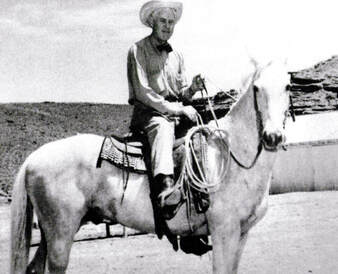Chester Logue
By Glynda Pflug
 Sheriff Chester Logue
Sheriff Chester Logue
Chester Logue was one of about 20 cowboys working cattle on a round-up on the Beauchamp Ranch in 1927.
The cowboys started discussing who would run for sheriff in the upcoming election. In the discussion that went on for some time, "Mutt" Beauchamp suggested that Logue seek the office.
"It seemed preposterous at time, but everyone I talked to about it thought I'd make a good sheriff," Logue said in a 1975 newspaper interview.
In the spring primary election, Logue beat both of the other candidates without a runoff even though there were less than 500 voters in the county.
"The population was considerably more than that, but you had to pay a poll tax to vote and not many of the newcomers - mostly oilfield workers from Oklahoma - wanted to pay the tax," he pointed out.
According to the newspaper article, when Logue took office on Jan. 1, 1928, he became the youngest unmarried county sheriff in Texas. He claimed most of his problems were over prohibition, "...because I knew every bootlegger in the county."
He immediately set out to end the illegal sale of alcohol and it is told, he used a pair of binoculars and stood on top of the courthouse to find the bootlegging operations. One bootlegger was setting up for business when Logue arrived and shut him down - much to the bootlegger's surprise. He asked Logue how he found him so fast, and Logue told him about his use of the binoculars.
Logue recalled, "The days when crime in Moore County was less violent, but the 'Breaks" in south Moore County frequently produced a haul of illegal liquor during prohibition days."
"Prohibition is why I was elected to office," Logue said. "When it was finally over, so were most of my problems."
The cowboys started discussing who would run for sheriff in the upcoming election. In the discussion that went on for some time, "Mutt" Beauchamp suggested that Logue seek the office.
"It seemed preposterous at time, but everyone I talked to about it thought I'd make a good sheriff," Logue said in a 1975 newspaper interview.
In the spring primary election, Logue beat both of the other candidates without a runoff even though there were less than 500 voters in the county.
"The population was considerably more than that, but you had to pay a poll tax to vote and not many of the newcomers - mostly oilfield workers from Oklahoma - wanted to pay the tax," he pointed out.
According to the newspaper article, when Logue took office on Jan. 1, 1928, he became the youngest unmarried county sheriff in Texas. He claimed most of his problems were over prohibition, "...because I knew every bootlegger in the county."
He immediately set out to end the illegal sale of alcohol and it is told, he used a pair of binoculars and stood on top of the courthouse to find the bootlegging operations. One bootlegger was setting up for business when Logue arrived and shut him down - much to the bootlegger's surprise. He asked Logue how he found him so fast, and Logue told him about his use of the binoculars.
Logue recalled, "The days when crime in Moore County was less violent, but the 'Breaks" in south Moore County frequently produced a haul of illegal liquor during prohibition days."
"Prohibition is why I was elected to office," Logue said. "When it was finally over, so were most of my problems."
- He also tackled the illegal operations that were going on in Belle Plain, east of Dumas.
- According to a story in The Moore County News Press in 1975, "Most of its key business people - bootleggers - wound up in district court. In a 2-year period, Sheriff Logue made some 16 bootlegging and gambling arrests, most of them in Belle Plain."
- He arrested both men and women for adultery - then against the law in Texas - and for vagrancy, mainly for offenses in which prostitution was suspected.
- The article went on to say, "The bootleggers who went to jail were prosecuted, but did not stay behind bars. Two leading figures in the moonshine trade were sentenced to prison terms, but afterwards posted handsome bonds and apparently ran off."
- Those arrested for adultery and prostitution were not prosecuted, probably because the women involved (former Borger bawdyhouse belles) skipped out of the county.
- When prohibition ended, Belle Plains residents quickly moved on and all remains are some concrete foundations.
- Logue was also sheriff when two attempts were made to rob First State Bank in a six-week period of time. The bank was then located on the northwest corner of Seventh Street and Bliss where the Police Department is now.
- The three men involved were later arrested by Logue when, on a "hunch," he and the night watchman who was kidnapped during one of the robberies traveled to Tucumcari, NM, where three men had been arrested there on an attempt to rob the post office.
- The night watchmen quickly identified the three from a line-up of 17 or 18 other men. They were brought back to Dumas, where they were tried. One man received a 10-year prison term and the other two were sentenced to 5-year terms.
- When his term ended, Logue was associated with the Federal Bureau of Investigations and later served with the Texas Comptroller's office.
- He retired in 1963 and moved to Amarillo, but always considered Dumas his home.